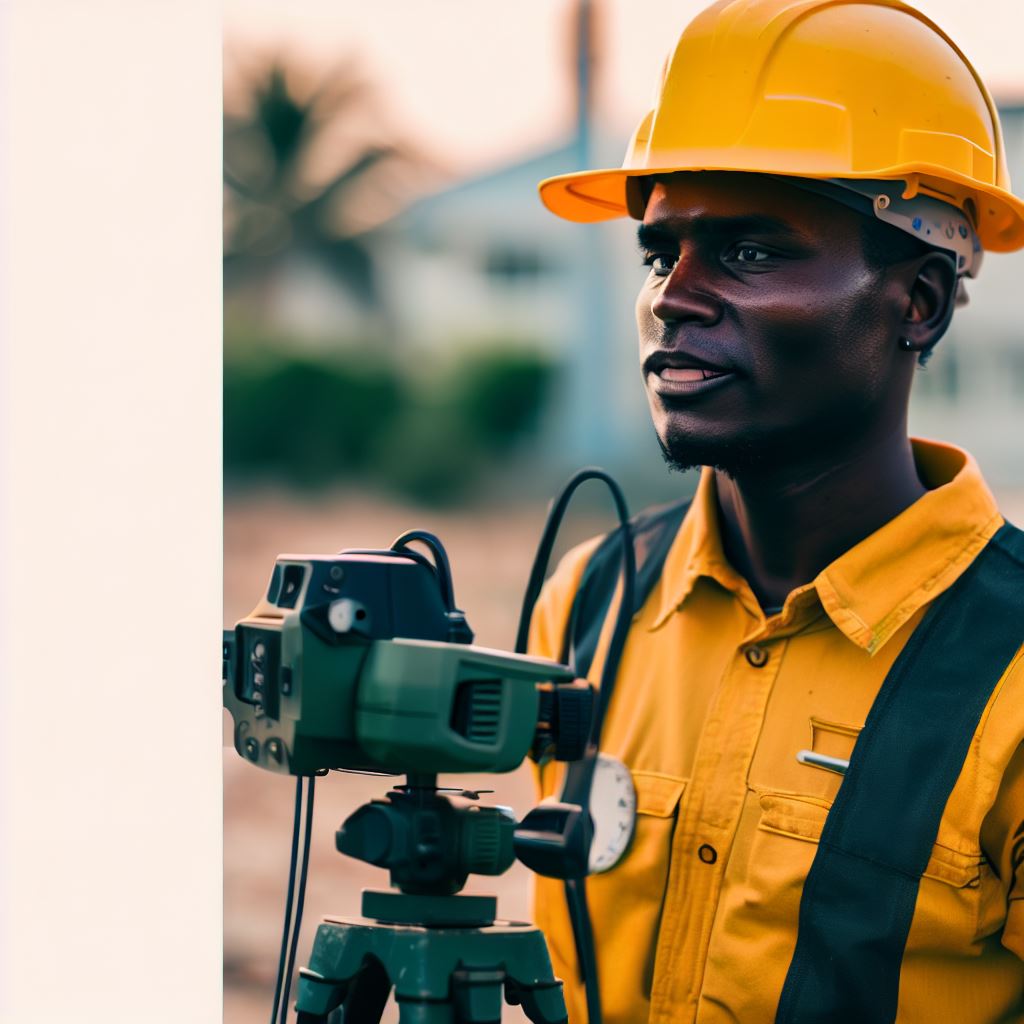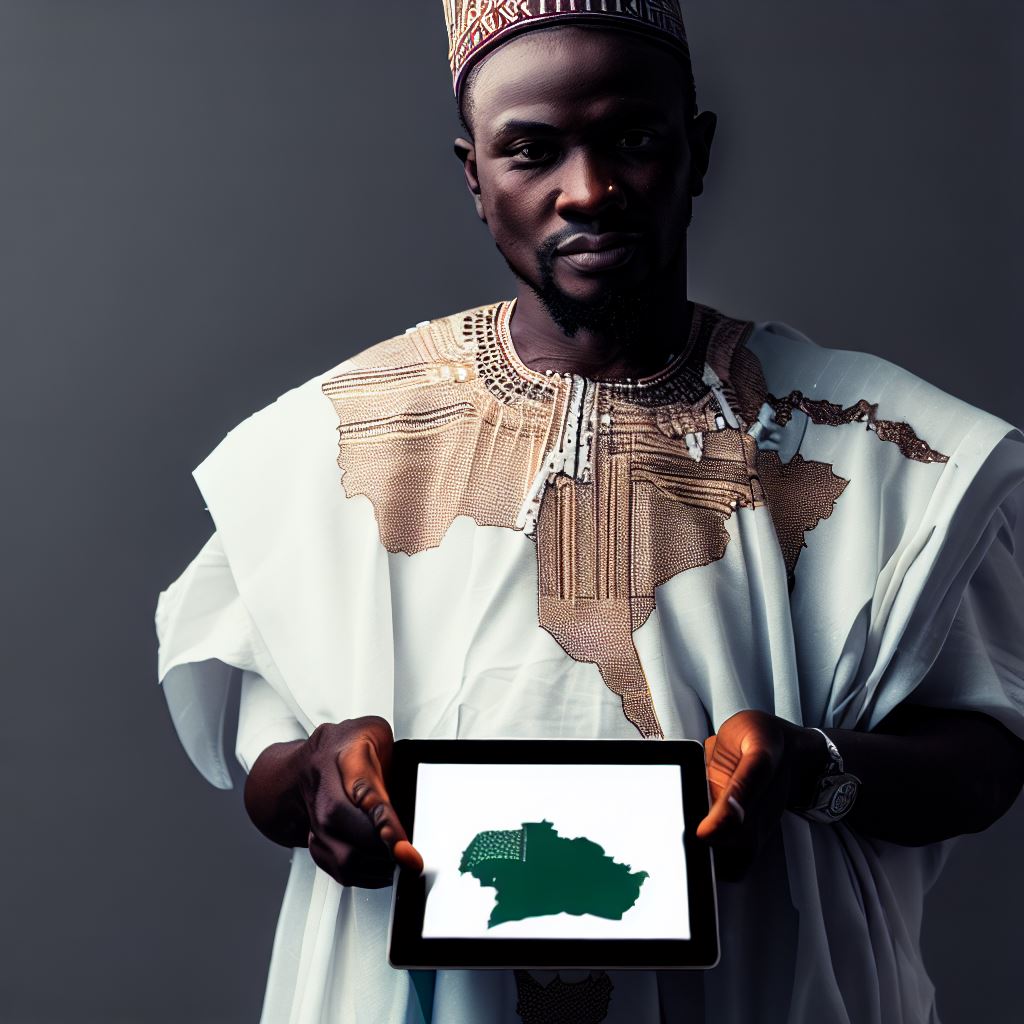Introduction
Surveyor tools and equipment play a crucial role in Nigeria for various reasons.
This blog post aims to provide an overview of their importance, as well as explain the purpose of the post.
Additionally, a thesis statement will be presented to guide the discussion.
Surveyor tools and equipment are vital in Nigeria as they facilitate accurate land measurements.
This blog post aims to discuss the significance of surveyor tools and equipment used in Nigeria.
The effective use of surveyor tools and equipment is essential for accurate land measurements and successful land development in Nigeria.
Background on Surveying in Nigeria
In this section, we will delve into the history and significance of surveying in Nigeria, as well as explore its importance in accurate land measurements and mapping.
Additionally, we will provide an overview of the vital role surveyors play in various sectors including construction, infrastructure development, and land management.
A. History and Significance of Surveying in Nigeria
- Surveying has a long history in Nigeria, dating back to colonial times.
- During the colonization period, surveying played a crucial role in establishing land boundaries.
- Surveying was also instrumental in determining land ownership and resolving disputes.
- Today, surveying continues to be an essential aspect of Nigeria’s land administration system.
- It contributes to sustainable development, efficient land management, and economic growth.
B. Importance of Accurate Land Measurements and Mapping
- Accurate land measurements are vital for proper land use planning and development.
- They ensure fair distribution of resources and prevent land conflicts and illegal encroachments.
- Land mapping helps create a comprehensive database for effective urban and rural planning.
- It enables the appropriate allocation of infrastructure and public services.
- Accurate mapping also facilitates disaster management and emergency response planning.
C. Overview of the Role of Surveyors in Various Sectors
Surveyors play a crucial role in multiple sectors, contributing to Nigeria’s overall development.
1. Construction Sector
- Surveyors provide accurate measurements for construction site layouts and building foundations.
- They ensure the alignment and proper positioning of structures according to approved plans.
- Surveyors also monitor construction progress and ensure compliance with regulations.
2. Infrastructure Development
- Surveying is essential for the design and construction of roads, bridges, and other infrastructure.
- Surveyors conduct topographic surveys to determine suitable routes and assess environmental impacts.
- They also provide precise measurements for the construction of utilities, such as water and sewage systems.
3. Land Management and Administration
- Surveyors play a crucial role in land management, including cadastral surveys for land registration.
- They establish accurate boundaries and maintain land records and cadastral maps.
- Surveyors also support land valuation assessments and help prevent land disputes.
4. Environmental Planning
- Surveying contributes to environmental planning by providing data on land use and vegetation cover.
- Surveyors assess and monitor changes in the natural landscape over time.
- This information aids in the preservation of ecosystems and effective natural resource management.
5. Geographical Information System (GIS)
- Surveyors play a crucial role in collecting and analyzing spatial data for GIS applications.
- They create accurate maps and provide geospatial information for decision-making processes.
- Surveyors enable efficient resource management, urban planning, and disaster response using GIS.
In essence, surveying has a rich history in Nigeria, contributing to accurate land measurements and mapping.
Surveyors play a vital role in various sectors, supporting construction, infrastructure development, land management, environmental planning, and GIS applications.
Their expertise is essential for Nigeria’s development and sustainable growth.
Read: Career Growth and Salary Expectations for Surveyors in Nigeria
Common Surveyor Tools Used in Nigeria
1. Theodolite
A precise instrument used for measuring angles in both horizontal and vertical planes.
It helps surveyors accurately determine distances and positions on the ground.
Theodolites are commonly used in construction and engineering projects.
2. Levels
There are different types of levels used in surveying, such as dumpy levels, laser levels, and digital levels.
They are used to determine the height or elevation of a point relative to a reference point.
Levels are essential in creating level, straight, and accurate surfaces.
3. GPS devices
Global Positioning System (GPS) devices are widely used by surveyors in Nigeria.
These devices use satellite signals to determine precise positions on the Earth’s surface.
GPS devices provide accurate coordinates and help surveyors in mapping, geodetic surveys, and land boundary determination.
4. Total station
A total station is an integrated surveying instrument that combines the functionalities of a theodolite and an electronic distance meter (EDM).
It allows surveyors to measure angles, distances, and vertical heights with high precision.
Total stations are commonly used for topographic surveys, cadastral mapping, and construction layout.
5. Dumpy level
A dumpy level is a type of optical surveying instrument used for leveling and aligning.
It consists of a telescope mounted on a tripod and a graduated staff.
Surveyors use dumpy levels to establish a horizontal plane and measure height differences.
6. Ranging rods and chains
Ranging rods and chains are traditional tools used in surveying to measure distances on the ground.
They are marked at regular intervals, allowing surveyors to measure distances accurately.
Chains are used to measure longer distances and are commonly made of metal.
7. Examples of other essential tools and equipment used in surveying
- Prisms: Used in combination with total stations for accurate distance measurements.
- Plumb bobs: Used to establish vertical reference points and measure vertical distances.
- Tripods: Provide stability and support for surveying instruments.
- Measuring tapes: Used for measuring shorter distances in surveying works.
- Compasses: Help surveyors determine directions and orientations.
- Data collectors: Used for collecting and storing survey data for further analysis and processing.
- Pruning saws and machetes: Used for clearing vegetation and obstructions during surveying operations.
These are just some of the common surveyor tools and equipment used in Nigeria. Depending on the specific surveying task, different tools may be required.
The advancements in technology have also introduced modern tools such as laser scanners and drones, which are increasingly being used in surveying applications.
The proper use of these tools, along with the skills and expertise of surveyors, ensures accurate and reliable measurements for various purposes, including land development, infrastructure planning, and resource management.
Read: Nigeria’s Land Surveying: Standards, Ethics, and Practice

Advanced Surveyor Equipment in Nigeria
When it comes to surveying tools and equipment in Nigeria, there is a range of advanced options available.
These advanced tools have revolutionized the surveying industry in the country, making it more efficient and accurate.
In this section, we will explore some of the most significant advanced surveyor equipment used in Nigeria and their functionalities and applications.
A. 3D laser scanners
These scanners have advanced capabilities and offer several benefits in surveying.
One of the remarkable tools used by surveyors in Nigeria is the 3D laser scanner.
These scanners provide precise and detailed measurements by emitting laser beams and capturing the reflected data.
They are capable of capturing millions of individual measurements within seconds, allowing surveyors to create high-resolution 3D models of objects, structures, and landscapes.
The benefits of 3D laser scanners include improved accuracy, reduced field time, and enhanced visualization of surveyed areas.
B. Remote sensing and aerial mapping devices
They play a crucial role in efficiently surveying large areas. Remote sensing and aerial mapping devices also play a vital role in surveying large areas efficiently.
These devices capture data from a distance without physical contact, allowing surveyors to collect information about inaccessible or hazardous locations.
By utilizing technologies such as satellite imagery, LiDAR, and aerial photography, surveyors can generate accurate maps and models of vast terrains.
This helps in land management, urban planning, and environmental monitoring in Nigeria.
C. Geographical Information System (GIS) software
This software is essential for data management and analysis in surveying. Geographical Information System (GIS) software is another crucial tool in modern surveying.
It provides a platform for storing, managing, analyzing, and visualizing geographic data.
GIS software enables surveyors to integrate various spatial data layers, such as topography, satellite imagery, and cadastral information.
They can perform complex spatial analysis, create thematic maps, and generate reports for decision-making processes.
In Nigeria, GIS software finds applications in land administration, infrastructure planning, and natural resource management.
D. Global Navigation Satellite System (GNSS)
GNSS is highly important and finds wide applications in modern surveying.
The Global Navigation Satellite System (GNSS) has a wide range of importance and applications in surveying.
GNSS refers to a constellation of satellites that provide positioning, navigation, and timing services.
Surveyors in Nigeria heavily rely on GNSS receivers to determine accurate locations, elevations, and distances.
This technology enables surveyors to establish control points, perform boundary surveys, and accurately stake out construction projects.
GNSS has significantly enhanced the accuracy and efficiency of surveying operations across Nigeria.
E. Drones
They are increasingly being used in surveying and mapping tasks in Nigeria.
Drones, also known as unmanned aerial vehicles (UAVs), have seen an increasing use in surveying and mapping tasks in Nigeria.
Equipped with high-resolution cameras and sensors, drones can capture detailed images and collect data from various angles and altitudes.
They are especially useful in surveying vast terrains, inspecting infrastructure, and monitoring construction sites.
Drones provide valuable visual and spatial data that can be processed to create maps, 3D models, and orthophotos.
Their ability to cover large areas quickly and their accessibility to remote or hazardous locations make them indispensable tools for surveyors in Nigeria.
In general, the advancements in surveyor equipment in Nigeria have greatly improved the efficiency and accuracy of surveying operations.
The introduction of 3D laser scanners, remote sensing devices, GIS software, GNSS, and drones has revolutionized the surveying industry in the country.
These advanced tools have enabled surveyors to gather precise data, create detailed models, and make informed decisions for various applications like land management, urban planning, and infrastructure development.
Read: Women in Surveying: A Look at the Profession in Nigeria
Challenges Faced by Surveyors in Nigeria
Surveyors in Nigeria face various challenges that hinder their work and the effective implementation of surveying projects.
These challenges include:
A. Inadequate funding and resources
The inadequate funding and resources available to surveyors in Nigeria hinder their ability to carry out their work effectively.
Without proper funding, it becomes challenging for surveyors to invest in modern tools, equipment, and software, which are essential for accurate and efficient surveying.
Surveying requires significant financial investment in equipment, tools, and technology.
However, surveyors in Nigeria often struggle due to limited funding from the government and lack of access to necessary resources.
B. Lack of awareness and recognition of the surveyor’s role
Many people in Nigeria are unaware of the importance of surveyors and the crucial role they play in land management, development, and infrastructure projects.
This lack of recognition can lead to underestimation or undervaluation of surveying services.
Furthermore, the lack of awareness and recognition of the surveyor’s role in Nigeria poses a significant challenge.
When people are unfamiliar with the importance of surveying, they may not prioritize it or seek professional surveying services when needed.
This lack of recognition can, in turn, affect the demand for surveying services and the overall status of the profession in the country.
C. Difficulties in accessing new technology and training opportunities
Surveying, like any other profession, relies on advancements in technology and continuous professional development.
However, surveyors in Nigeria often struggle to access the latest tools, software, and training due to financial constraints or limited availability.
Moreover, the difficulties in accessing new technology and training opportunities affect the quality of surveying services in Nigeria.
Technological advancements, such as GPS systems, robotic total stations, and advanced software, can significantly improve the accuracy and efficiency of surveys.
However, surveyors in Nigeria often lack the resources or opportunities to acquire such technologies or receive proper training on their usage.
D. Interference from local communities or disputes over land ownership
Surveyors in Nigeria often face challenges when local communities or individuals dispute land ownership, boundaries, or legal rights.
Such disputes can result in conflict, delays, or even halt surveying projects altogether.
In addition to financial and technological challenges, surveyors in Nigeria also encounter interference from local communities or disputes over land ownership.
Publish Your Professional Profile, Business or Brand
Showcase your expertise, gain trust, and boost visibility instantly on Professions.ng.
Publish NowLand disputes are prevalent in Nigeria, and surveyors often find themselves caught in the middle of such conflicts.
These disputes can lead to interruptions, delays, or even physical threats to surveyors conducting their work.
Resolving these conflicts and obtaining accurate survey data becomes difficult under such circumstances.
In review, surveyors in Nigeria encounter various challenges that hinder their work and affect the effective implementation of surveying projects.
Inadequate funding and resources, lack of awareness and recognition, difficulties in accessing new technology and training opportunities, and interference from local communities or land disputes are some of the primary challenges faced by surveyors in Nigeria.
Addressing these challenges through increased funding, awareness campaigns, improved access to technology and training, and proactive conflict resolution measures will be crucial in empowering Nigerian surveyors and advancing the field of surveying in the country.
Read: The Impact of Technology on Surveying in Nigeria Today
Improvements and Future Trends
In Nigeria, efforts are being made to improve the surveying profession and ensure its growth.
These initiatives aim to enhance the skills and capabilities of surveyors, as well as expand the scope and impact of their work.
A. Efforts to improve the surveying profession in Nigeria
- Continuous professional development programs are being implemented to keep surveyors up-to-date with the latest industry trends and practices.
- Professional bodies, such as the Nigerian Institution of Surveyors (NIS), are actively promoting excellence in surveying and ensuring adherence to ethical standards.
- Collaborations between universities, government agencies, and professional associations are fostering research and knowledge-sharing to drive innovation in the field.
B. Increased government support for infrastructure development and surveying activities
- The Nigerian government recognizes the importance of infrastructure in driving economic growth and has prioritized its development.
- As a result, more funding and resources are being allocated to infrastructure projects, which creates opportunities for surveyors to contribute their expertise.
- Government agencies are also actively engaging surveyors to provide accurate data for project planning and execution.
C. The integration of new technologies into surveying practices
- Technological advancements, such as Geographic Information Systems (GIS), Global Positioning Systems (GPS), and remote sensing, are revolutionizing surveying in Nigeria.
- These tools enable surveyors to collect and analyze data more efficiently, accurately, and rapidly.
- By adopting technological innovations, surveyors can enhance their productivity, improve the quality of their work, and provide better services to clients.
D. The importance of surveying education and professional development
- Recognizing that a strong educational foundation is crucial for the development of competent surveyors, educational institutions in Nigeria are offering comprehensive surveying courses.
- These programs provide students with the necessary knowledge and skills to excel in the profession.
- Continuing education and professional development opportunities, such as workshops, seminars, and certifications, further enhance surveyors’ expertise and ensure their continuous growth.
In a nutshell, the surveying profession in Nigeria is undergoing positive changes and experiencing promising trends.
Through efforts to improve the profession, increased government support, the integration of new technologies, and an emphasis on education and professional development, the surveying sector in Nigeria is poised for growth and prosperity.
Read: How to Become a Licensed Real Estate Agent in Nigeria
Conclusion
This blog post has reviewed the various surveyor tools and equipment used in Nigeria.
We have discussed the importance of these tools in ensuring accurate measurements, mapping, and land management.
From theodolites and total stations to GPS devices and drones, surveyors in Nigeria rely on these instruments to carry out their tasks efficiently.
These tools play a crucial role in the development of infrastructure, construction projects, and land management in the country.
If you are interested in pursuing a career in land management, construction, or infrastructure development in Nigeria, exploring the field of surveying is highly recommended.
Not only will you get to work with advanced tools and equipment, but you will also contribute to the growth and development of the nation.
So, don’t hesitate to dive into the world of surveying in Nigeria and make a meaningful impact in your chosen field.




